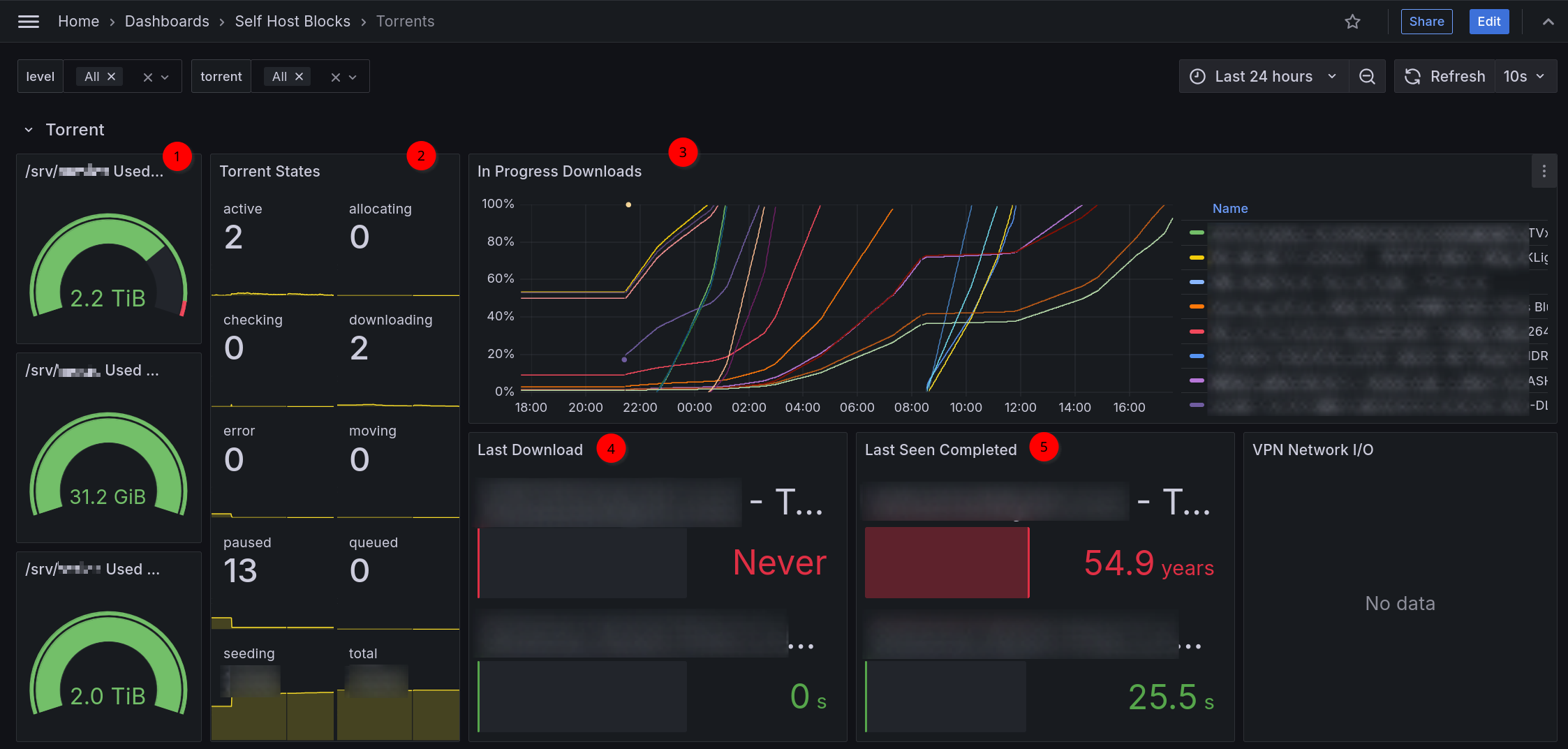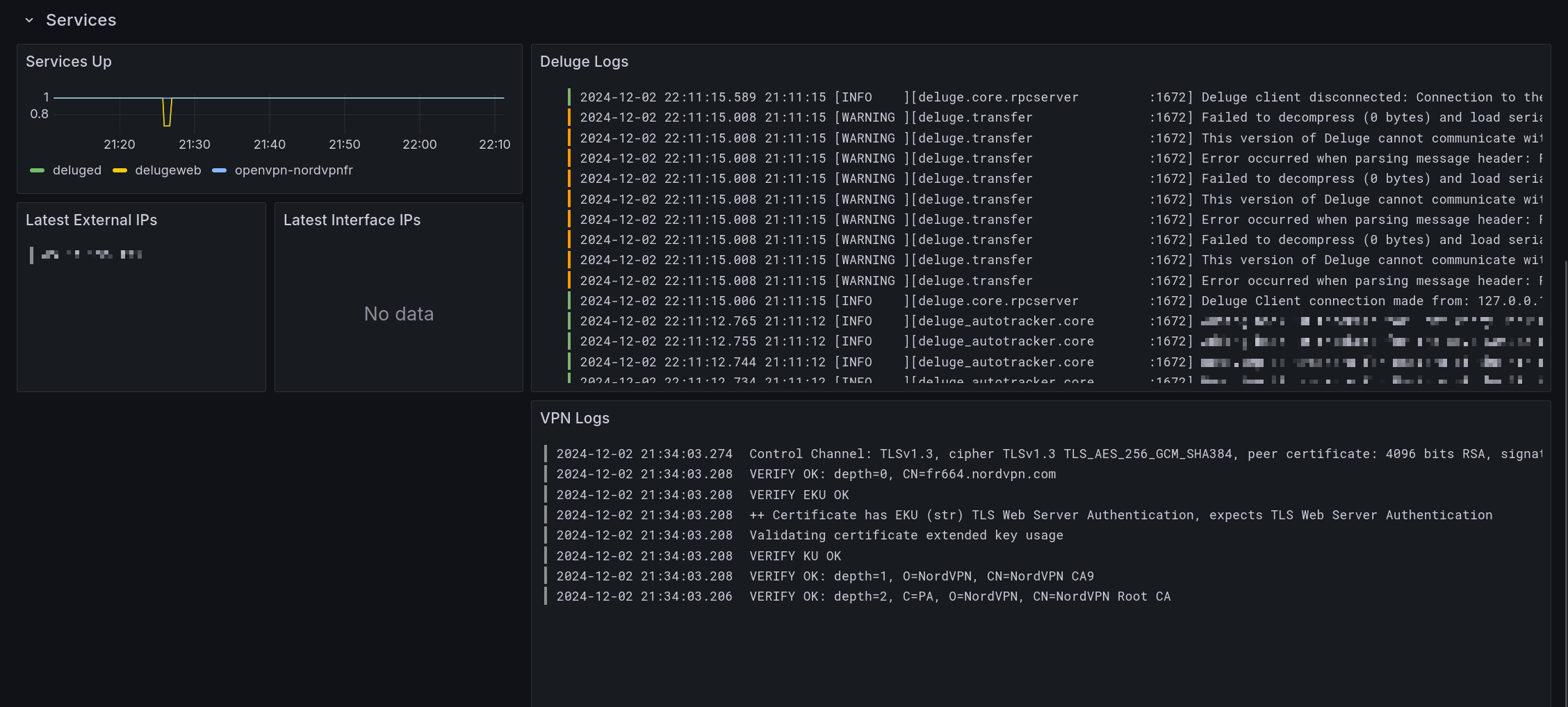Monitoring Block
Table of Contents
Defined in /modules/blocks/monitoring.nix.
This block sets up the monitoring stack for Self Host Blocks. It is composed of:
Grafana as the dashboard frontend.
Prometheus as the database for metrics.
Loki as the database for logs.
Features
Usage
The following snippet assumes a few blocks have been setup already:
the secrets block with SOPS,
the
shb.sslblock,the
shb.lldapblock.the
shb.autheliablock.
{
shb.monitoring = {
enable = true;
subdomain = "grafana";
inherit domain;
contactPoints = [ "me@example.com" ];
adminPassword.result = config.sops.secrets."monitoring/admin_password".result;
secretKey.result = config.sops.secrets."monitoring/secret_key".result;
sso = {
enable = true;
authEndpoint = "https://${config.shb.authelia.subdomain}.${config.shb.authelia.domain}";
sharedSecret.result = config.shb.sops.secret.oidcSecret.result;
sharedSecretForAuthelia.result = config.shb.sops.secret.oidcAutheliaSecret.result;
};
};
shb.sops.secret."monitoring/admin_password".request = config.shb.monitoring.adminPassword.request;
shb.sops.secret."monitoring/secret_key".request = config.shb.monitoring.secretKey.request;
shb.sops.secret."monitoring/oidcSecret".request = config.shb.monitoring.sso.sharedSecret.request;
shb.sops.secret."monitoring/oidcAutheliaSecret" = {
request = config.shb.monitoring.sso.sharedSecretForAuthelia.request;
settings.key = "monitoring/oidcSecret";
};
};
Secrets can be randomly generated with nix run nixpkgs#openssl -- rand -hex 64.
With that, Grafana, Prometheus, Loki and Promtail are setup! You can access Grafana at
grafana.example.com with user admin and the password from the sops key monitoring/admin_password.
The user and admin LDAP groups are created automatically.
SMTP
I recommend adding a STMP server configuration so you receive alerts by email:
shb.monitoring.smtp = {
from_address = "grafana@$example.com";
from_name = "Grafana";
host = "smtp.mailgun.org";
port = 587;
username = "postmaster@mg.example.com";
passwordFile = config.sops.secrets."monitoring/smtp".path;
};
sops.secrets."monitoring/secret_key" = {
sopsFile = ./secrets.yaml;
mode = "0400";
owner = "grafana";
group = "grafana";
restartUnits = [ "grafana.service" ];
};
Log Optimization
Since all logs are now stored in Loki, you can probably reduce the systemd journal retention time with:
# See https://www.freedesktop.org/software/systemd/man/journald.conf.html#SystemMaxUse=
services.journald.extraConfig = ''
SystemMaxUse=2G
SystemKeepFree=4G
SystemMaxFileSize=100M
MaxFileSec=day
'';
Other options are accessible through the upstream services modules. You might for example want to update the metrics retention time with:
services.prometheus.retentionTime = "60d";
Provisioning
Self Host Blocks will create automatically the following resources:
For Grafana:
datasources
dashboards
contact points
notification policies
alerts
For Prometheus, the following exporters and related scrapers:
node
smartctl
nginx
For Loki, the following exporters and related scrapers:
systemd
Those resources are namespaced as appropriate under the Self Host Blocks namespace:
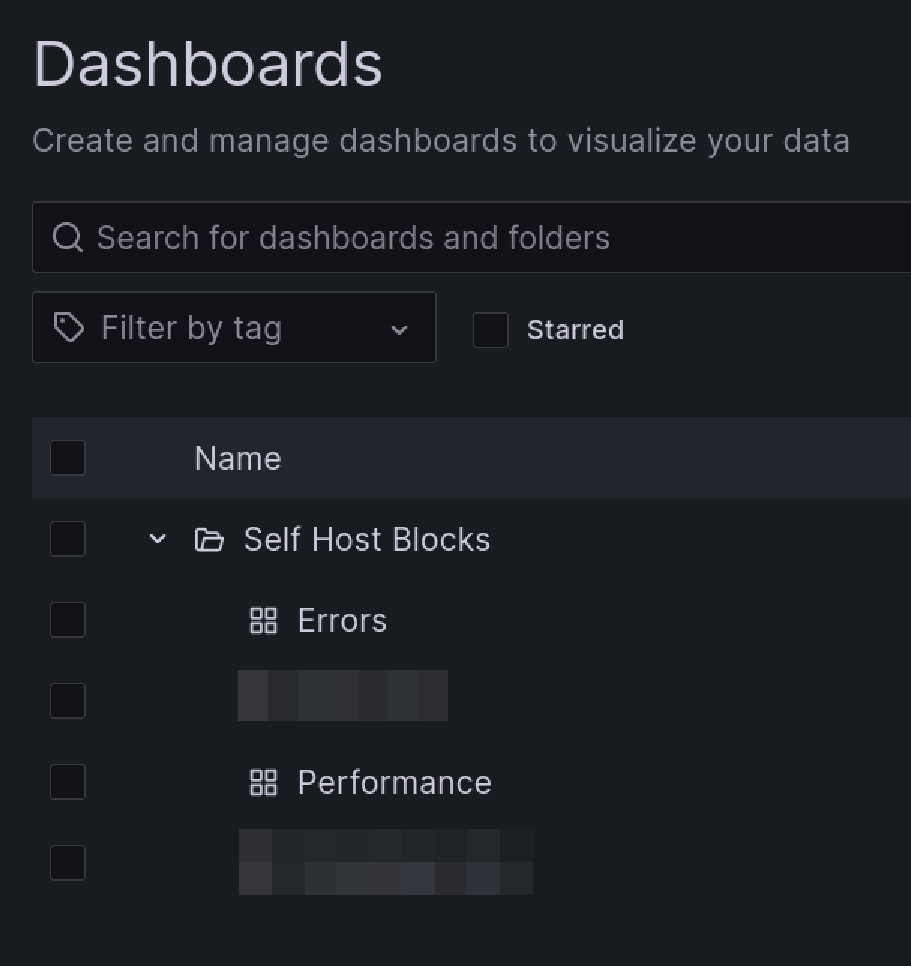
Errors Dashboard
This dashboard is meant to be the first stop to understand why a service is misbehaving.
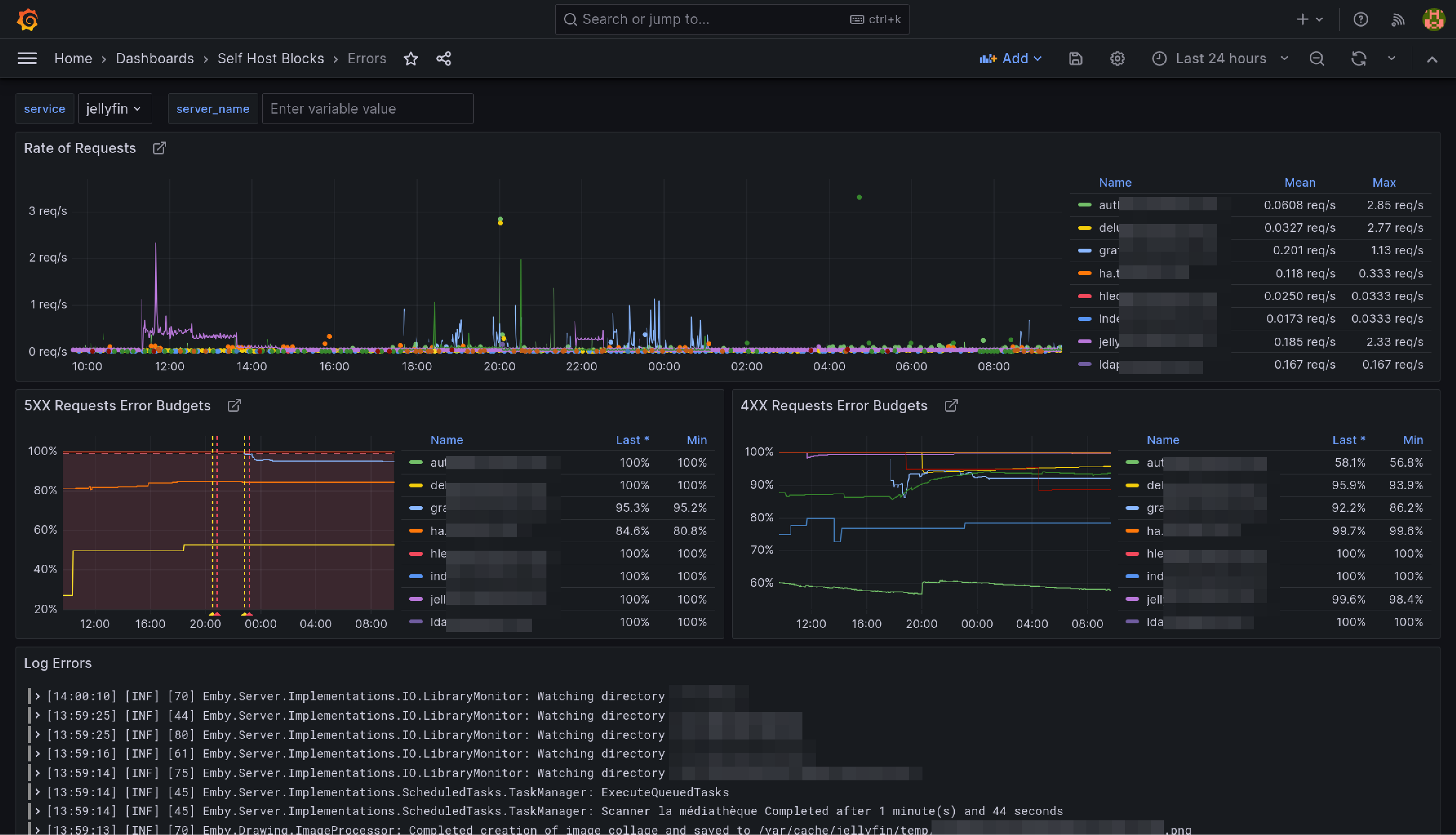
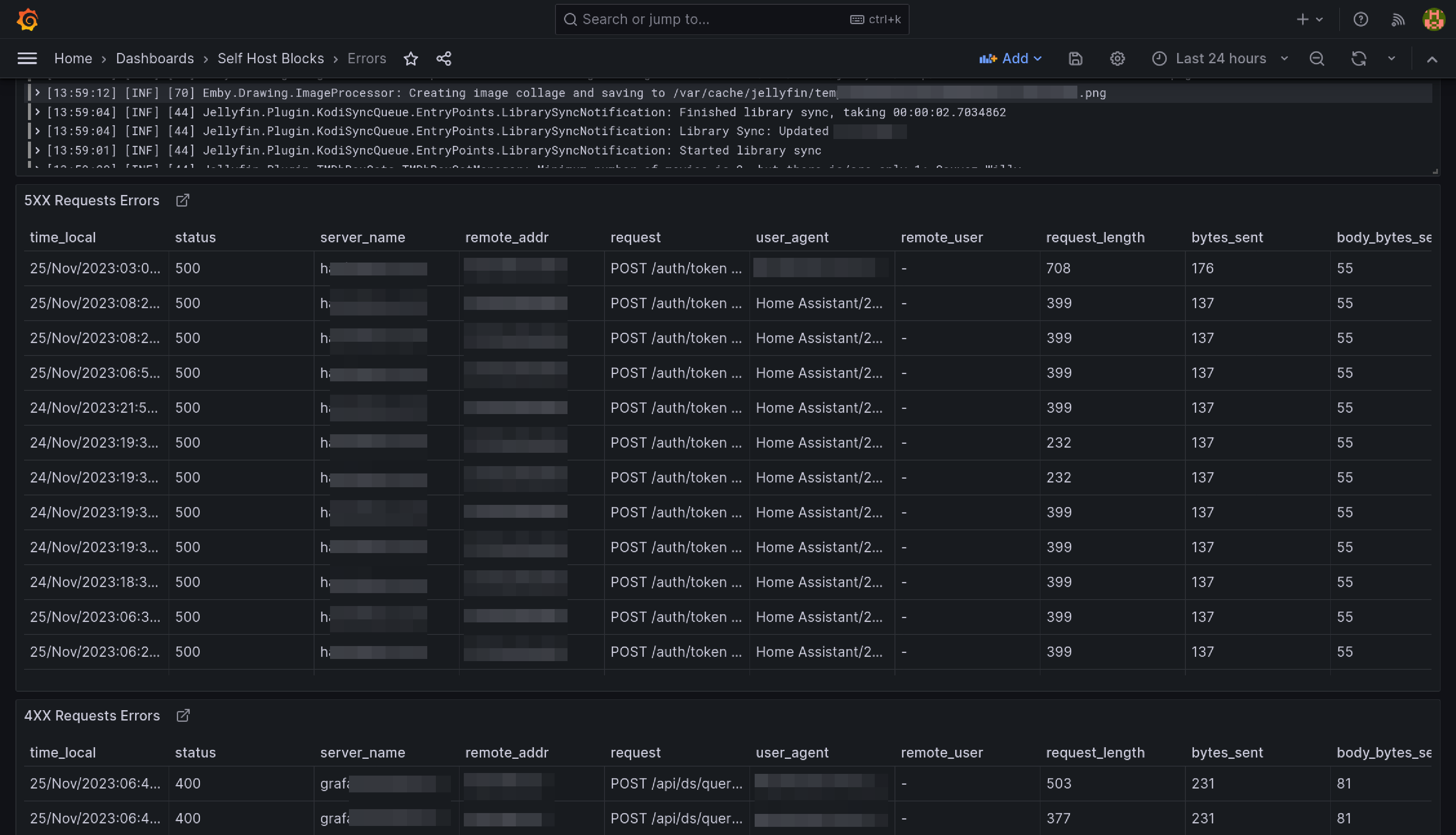
The yellow and red dashed vertical bars correspond to the Requests Error Budget Alert firing.
Performance Dashboard
This dashboard is meant to be the first stop to understand why a service is performing poorly.
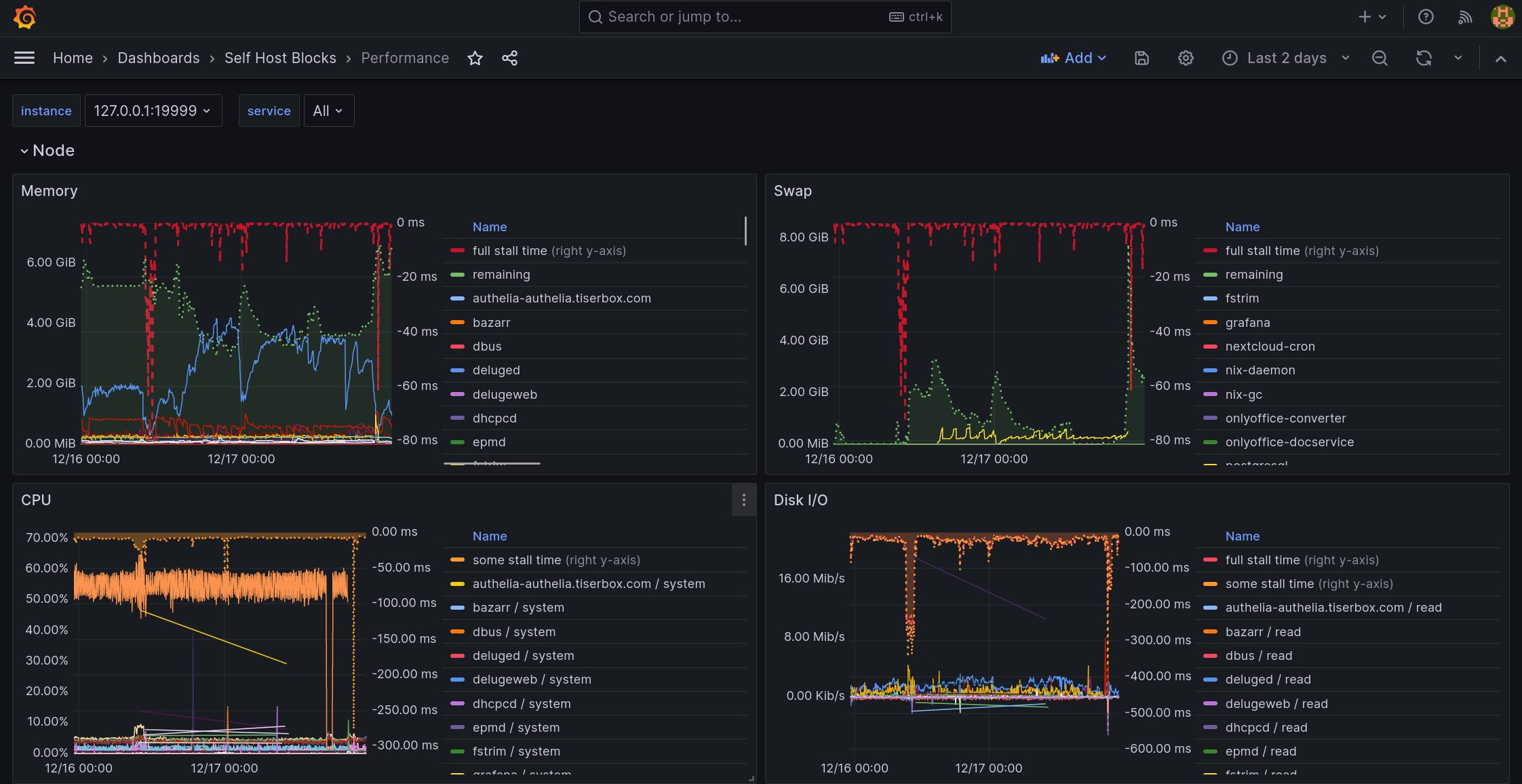
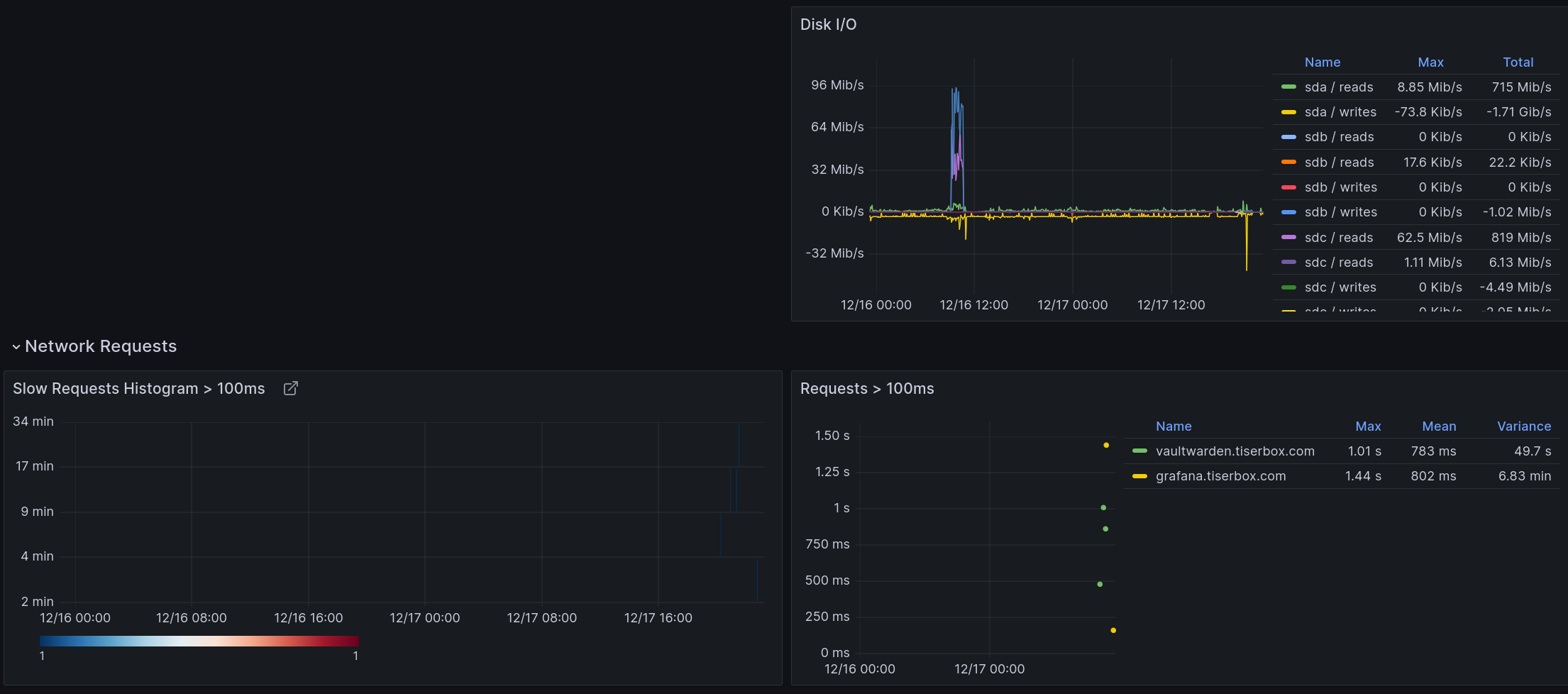
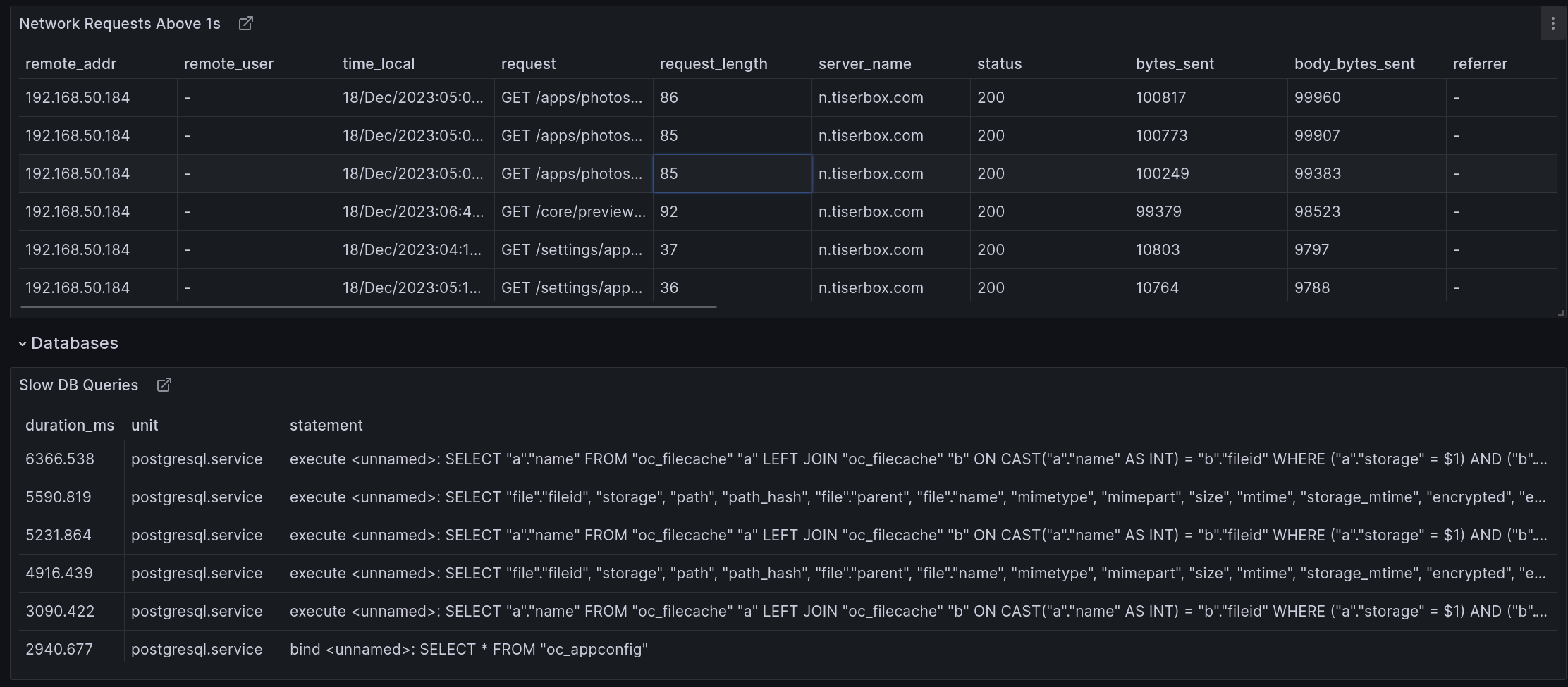
Nextcloud Dashboard
See Nextcloud service manual.
Backups Dashboard and Alert
This dashboard shows Restic and BorgBackup backup jobs, or any job with “backup” in the systemd service name.
Dashboard
Variables:
The “Job” variable allows to select one or more backup jobs. “All” is the default.
The “mountpoints” variable allows to select only relevant mountpoints for backup. “All” is the default.
The most important graphs are the first three:
“Backup Jobs in the Past Week”: Shows stats on all backup jobs that ran in the past. It is sorted by the “Failed” column in descending order. This way, one can directly see when a job has failures.
“Schedule”: Shows when a job will run. The unit is “Datetime from Now” meaning it shows when a job ran or will run relative to the current time. An annotation will show up when the “Late Backups” alert fired or resolved.
“Backup jobs”: Shows when a backup job ran. Normally, jobs running for less than 15 seconds will not show up in the graph. We crafted a query that still shows them but the length is 15 seconds, even if the backup job took less time to run.

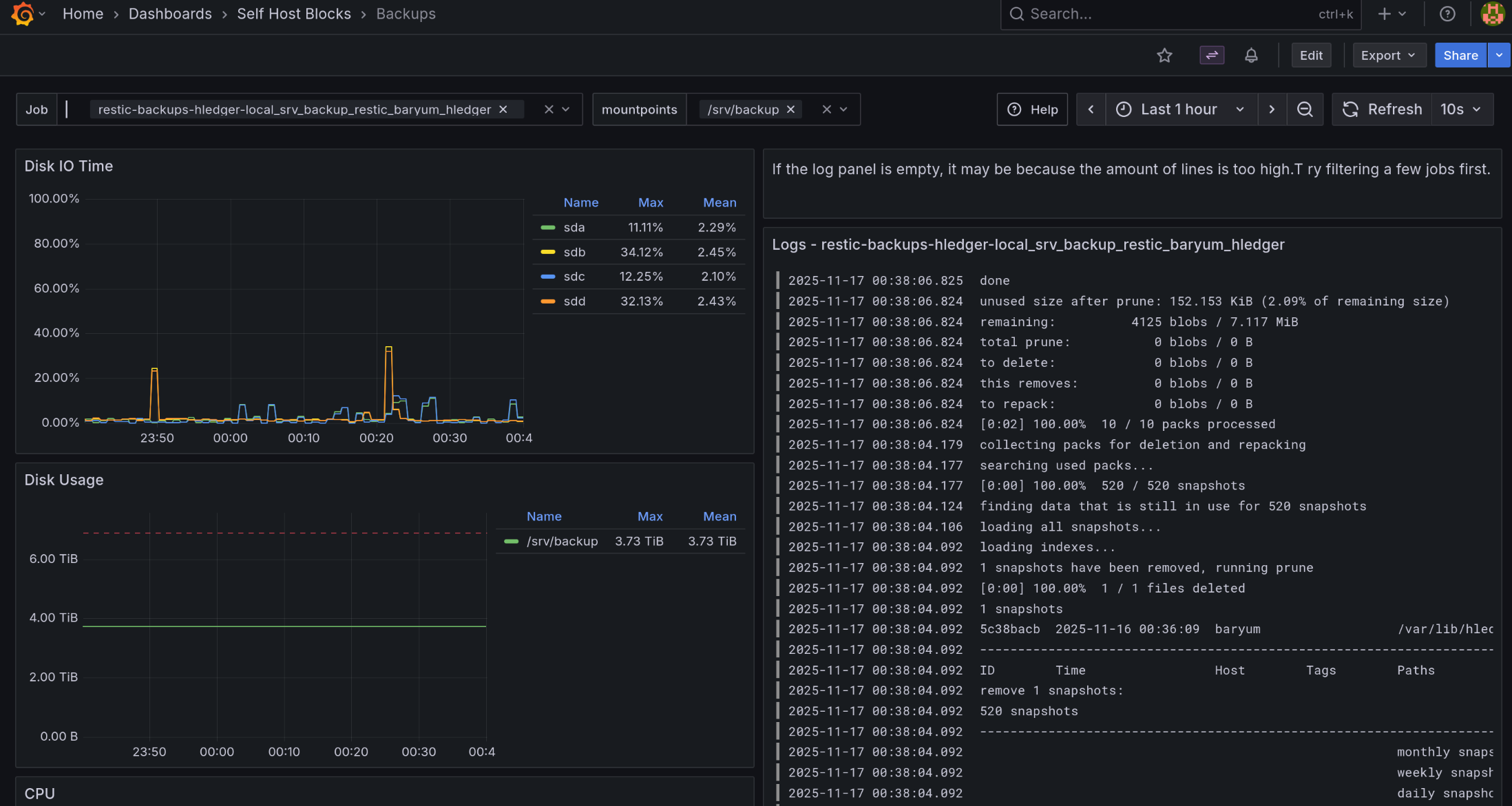
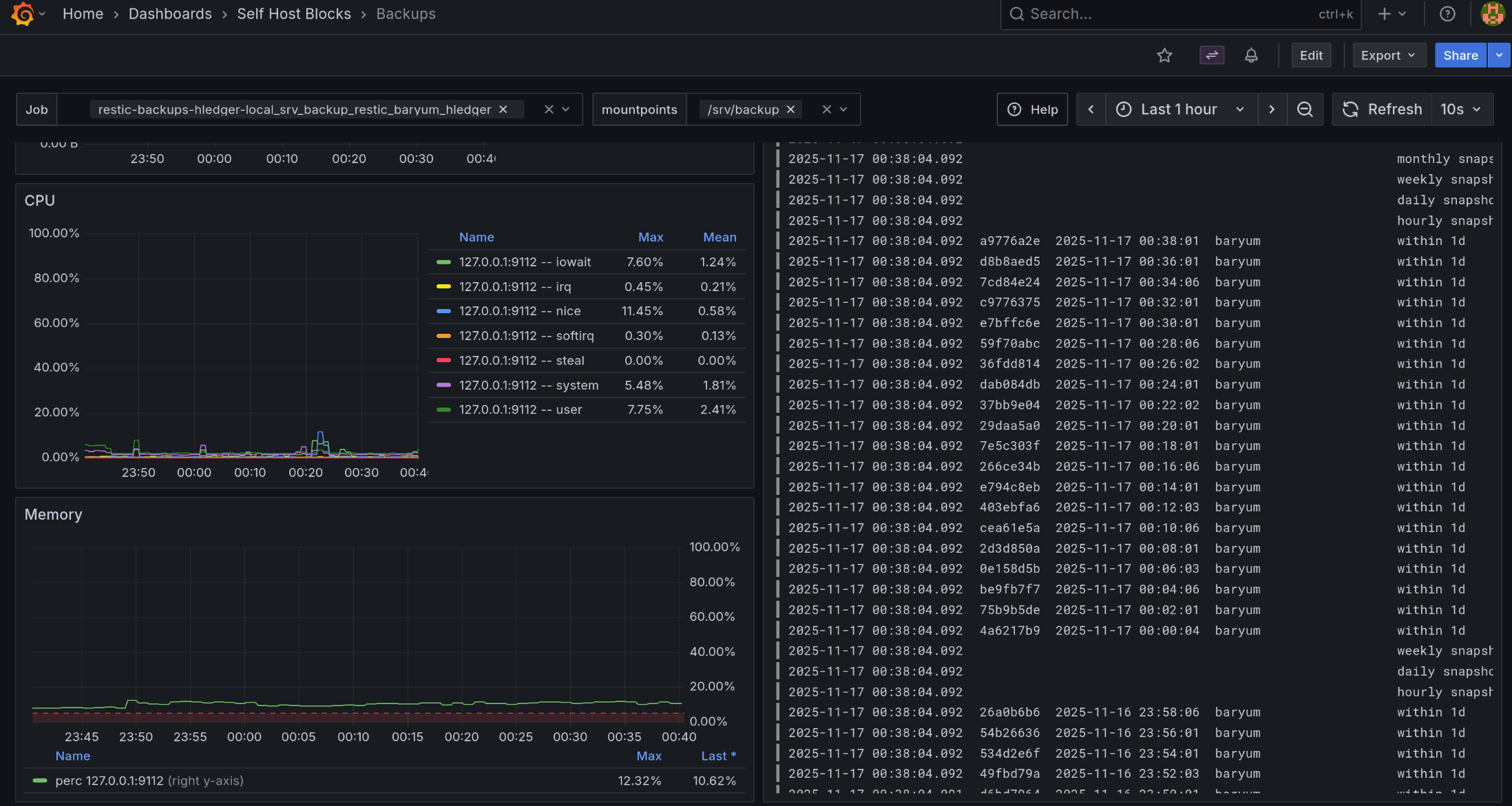
Alerts
The “Late Backups” alert will fire if a backup job did not run at all in the last 24 hours or if all runs were failures in the last 24 hours. It will show up as annotations in the “Schedule” panel of the dashboard.
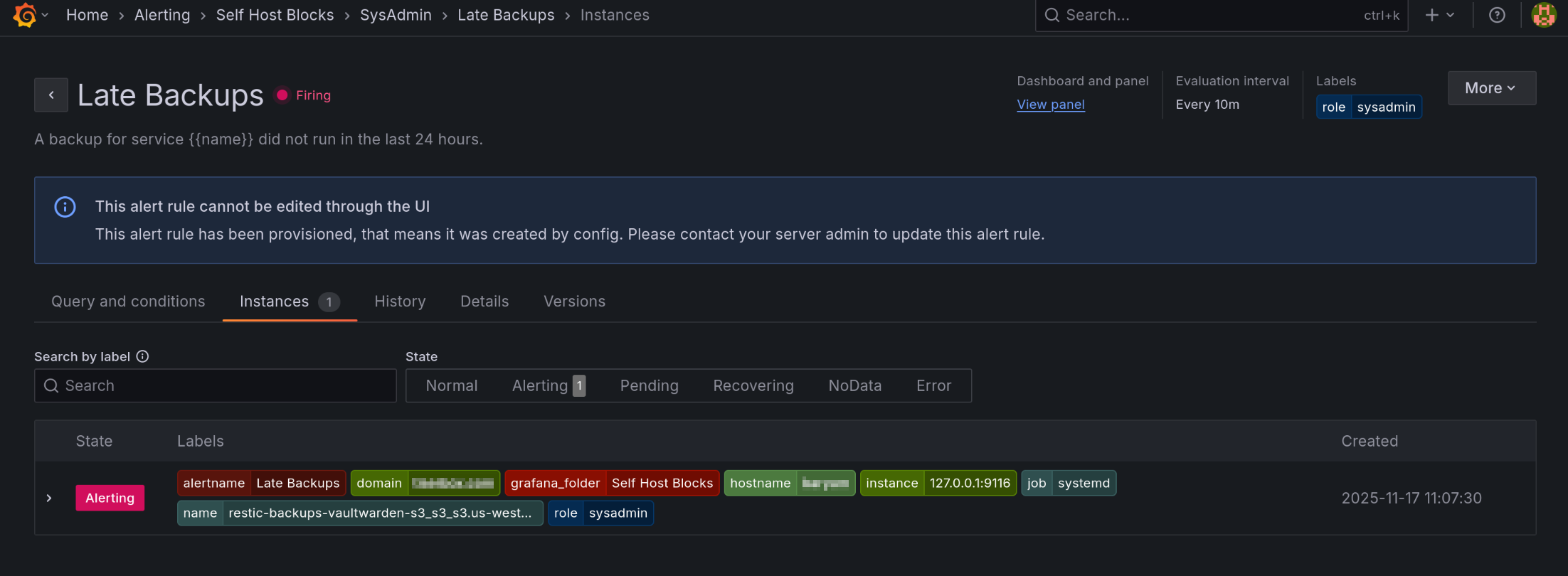
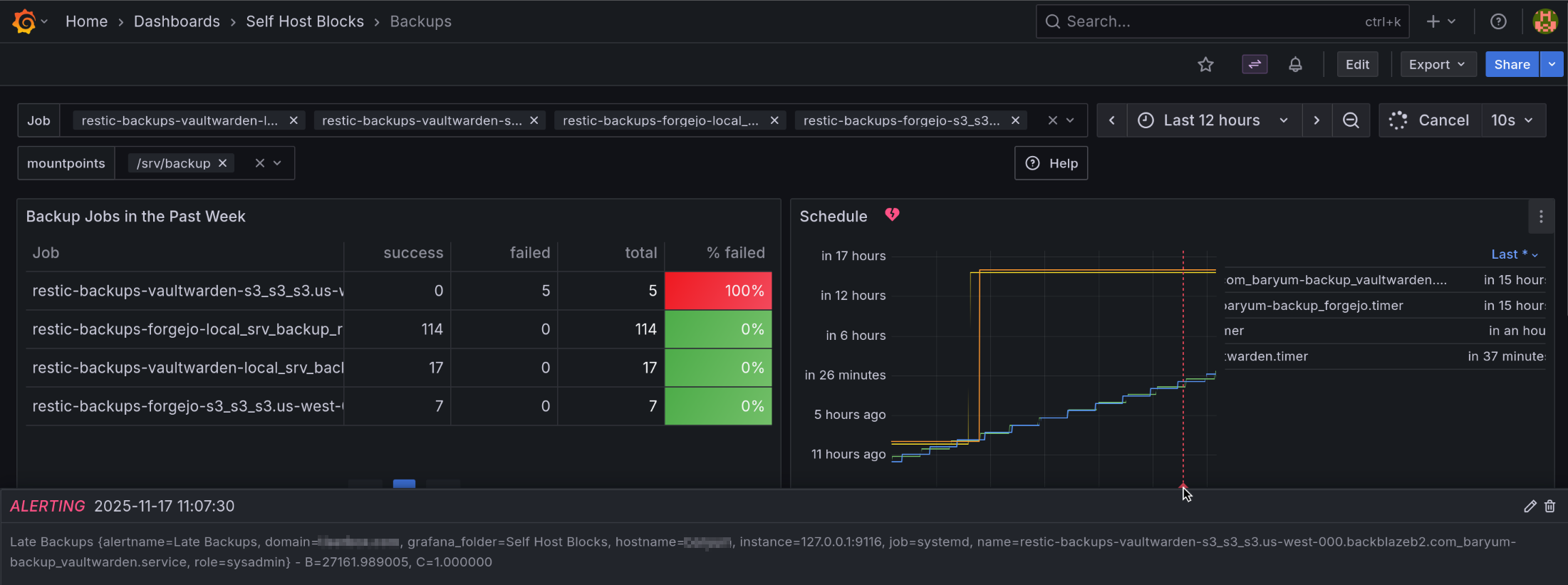
Requests Error Budget Alert
This alert will fire when the ratio between number of requests getting a 5XX response from a service and the total requests to that service exceeds 1%.
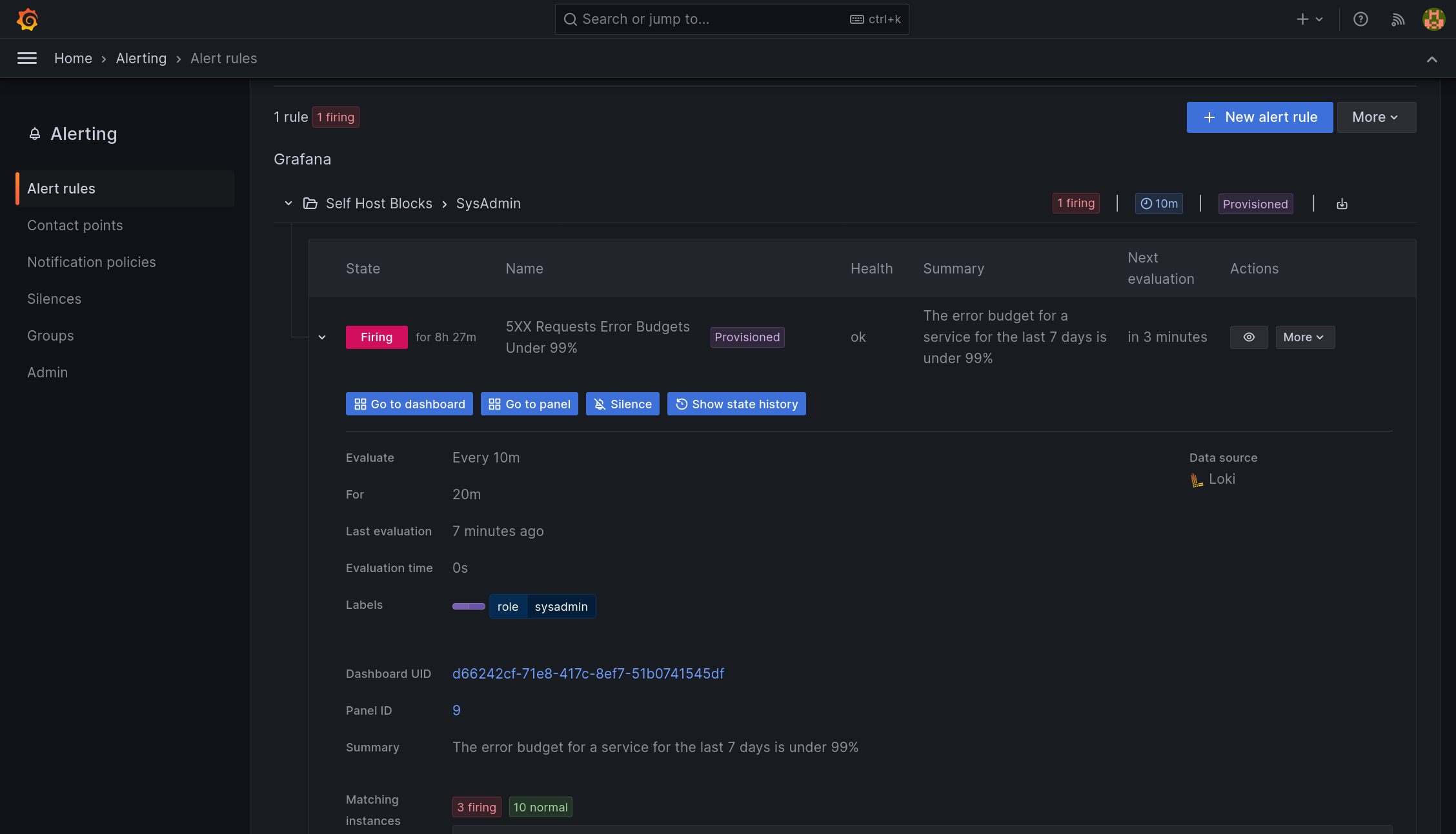
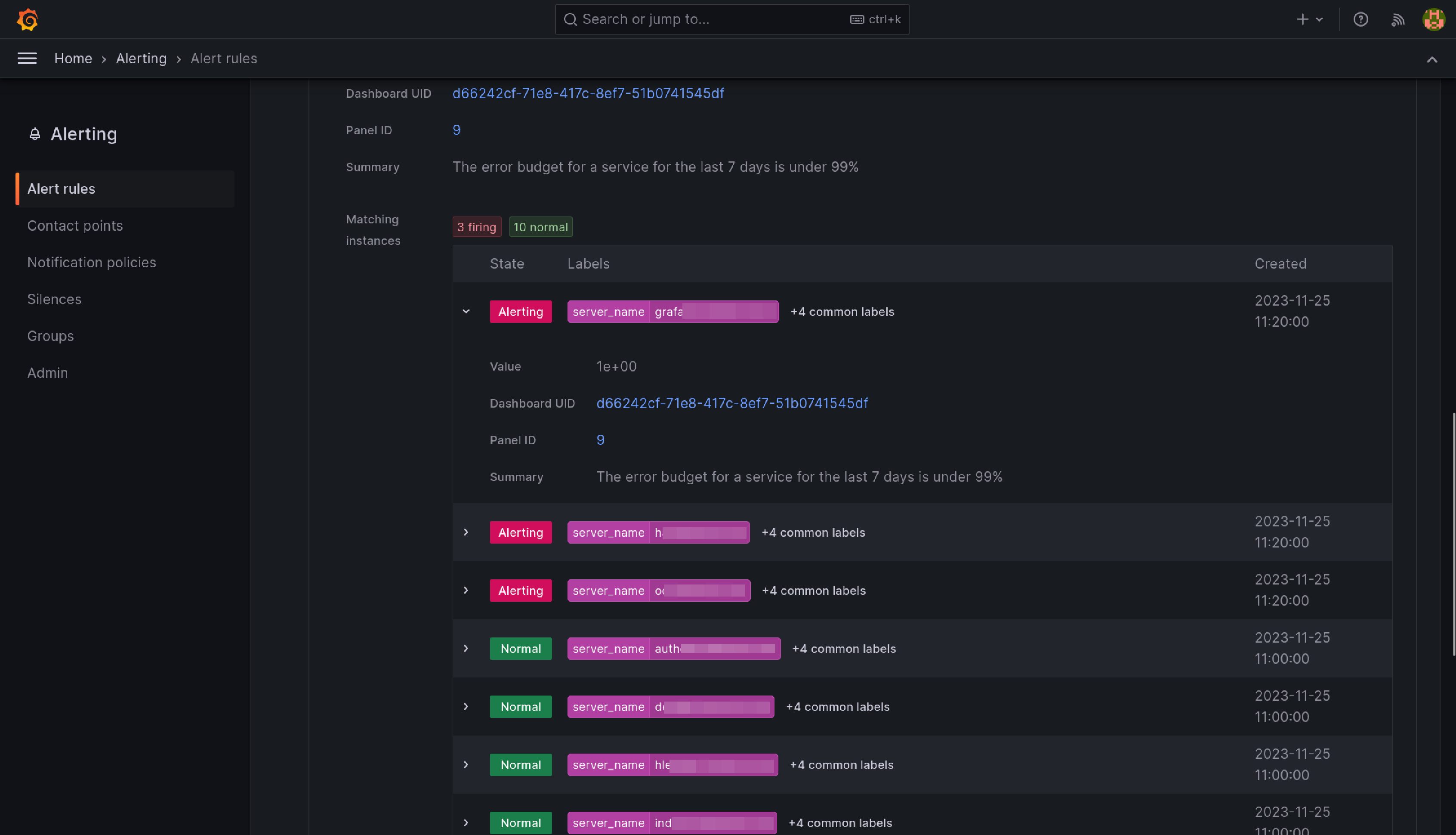
SSL Certificates Dashboard and Alert
This dashboard shows Let’s Encrypt renewal and setup jobs, or any job starting with “acme-” in the systemd service name.
Dashboard
Variables:
The “Job” variable allows to focus on one or more certificate. “All” is the default.
Graphs:
“Certificate Remaining Validity”: Shows in how long will certificates expire. It shows all files under
/var/lib/acme. An annotation will show up when the “Certificate Did Not Renew” alert fired or resolved.“Schedule”: Shows when a job will run. The unit is “Datetime from Now” meaning it shows when a job ran or will run relative to the current time.
“Jobs in the Past Week”: Shows stats on all renewal jobs that ran in the past. It is sorted by the “Failed” column in descending order. This way, one can directly see when a job has failures. Note, the stats is not accurate because detecting jobs taking taking less than 15 seconds is not supported well.
“Job Runs”: Shows when a renewal job ran. Normally, jobs running for less than 15 seconds will not show up in the graph. We crafted a query that still shows them but the length is 100 seconds, even if the job took less time to run.
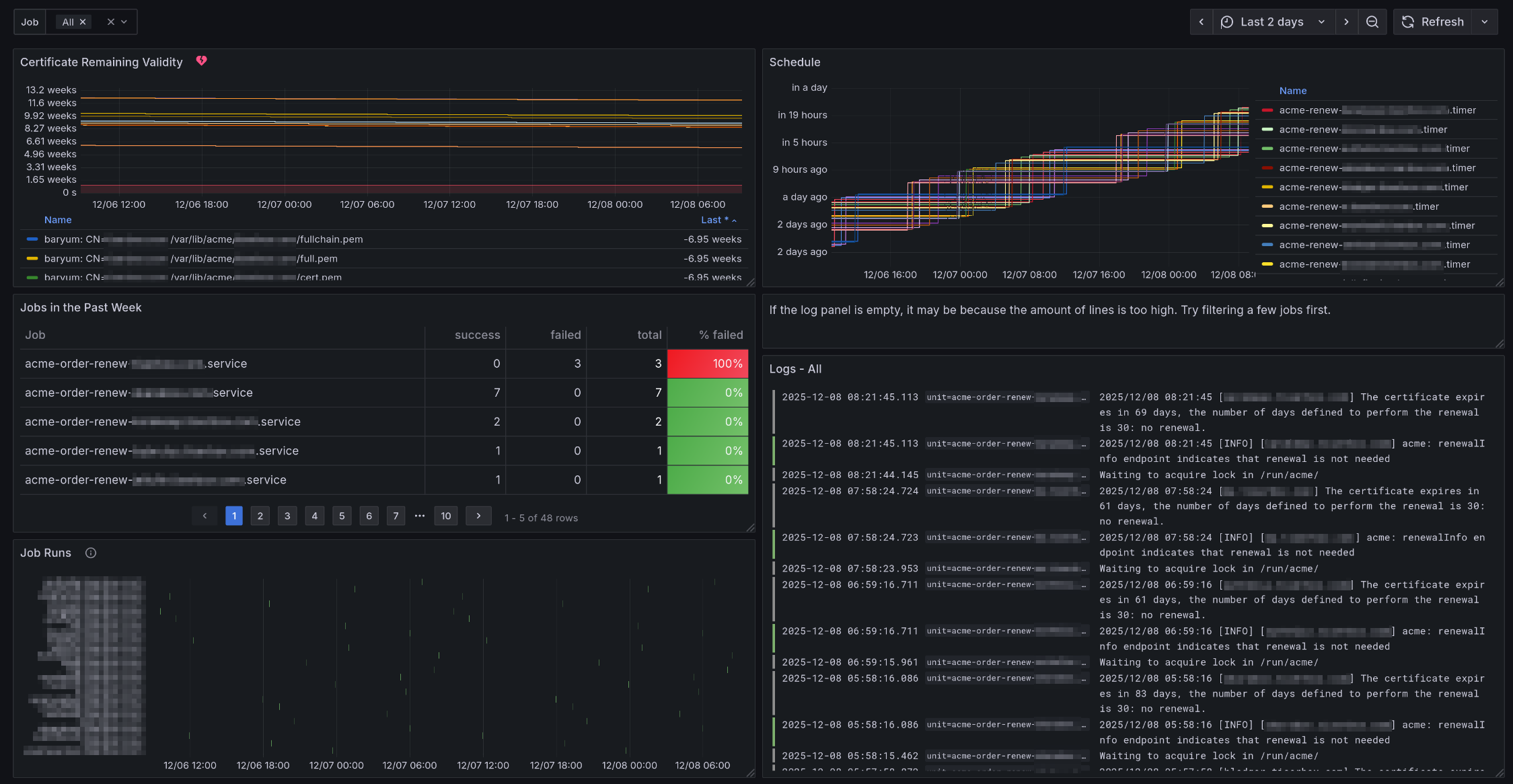
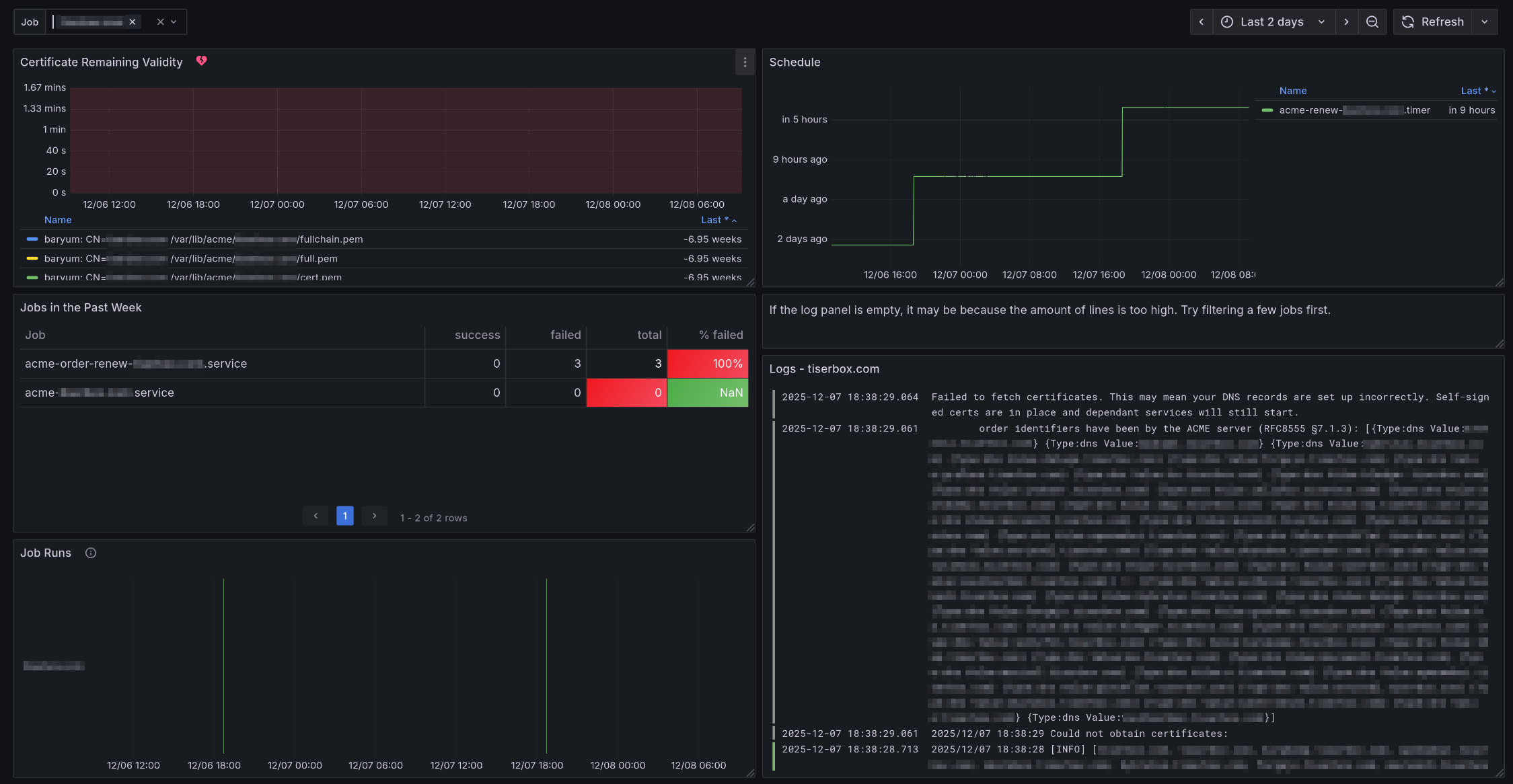
Alerts
The “Certificate Did Not Renew” alert will fire if a backup job did not run at all in the last 24 hours or if all runs were failures in the last 24 hours. It will show up as annotations in the “Schedule” panel of the dashboard.
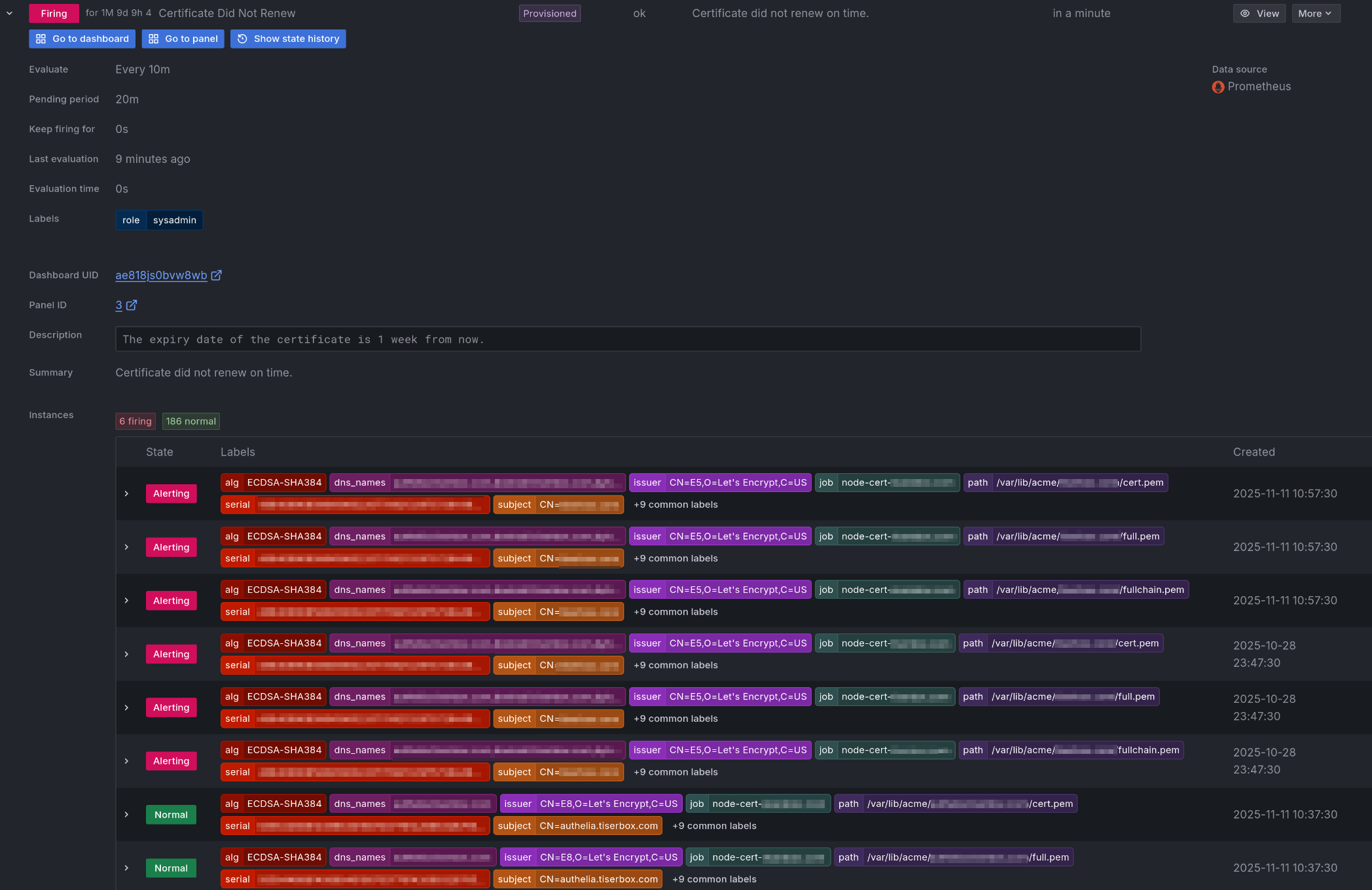
Options Reference
-
shb.monitoring.enable -
Whether to enable selfhostblocks.monitoring.
Type: boolean
Default:
falseExample:
trueDeclared by:
<selfhostblocks/modules/blocks/monitoring.nix> -
shb.monitoring.adminPassword -
Initial admin password.
Type: submodule
Declared by:
<selfhostblocks/modules/blocks/monitoring.nix> -
shb.monitoring.adminPassword.request -
Request part of the secret contract.
Options set by the requester module enforcing some properties the secret should have.
Type: submodule
Default:
""Declared by:
<selfhostblocks/modules/blocks/monitoring.nix> -
shb.monitoring.adminPassword.request.group -
Linux group owning the secret file.
Type: string
Default:
"grafana"Declared by:
<selfhostblocks/modules/blocks/monitoring.nix> -
shb.monitoring.adminPassword.request.mode -
Mode of the secret file.
Type: string
Default:
"0400"Declared by:
<selfhostblocks/modules/blocks/monitoring.nix> -
shb.monitoring.adminPassword.request.owner -
Linux user owning the secret file.
Type: string
Default:
"grafana"Declared by:
<selfhostblocks/modules/blocks/monitoring.nix> -
shb.monitoring.adminPassword.request.restartUnits -
Systemd units to restart after the secret is updated.
Type: list of string
Default:
[ "grafana.service" ]Declared by:
<selfhostblocks/modules/blocks/monitoring.nix> -
shb.monitoring.adminPassword.result -
Result part of the secret contract.
Options set by the provider module that indicates where the secret can be found.
Type: submodule
Default:
{ path = "/run/secrets/secret"; }Declared by:
<selfhostblocks/modules/blocks/monitoring.nix> -
shb.monitoring.adminPassword.result.path -
Path to the file containing the secret generated out of band.
This path will exist after deploying to a target host, it is not available through the nix store.
Type: absolute path
Default:
"/run/secrets/secret"Declared by:
<selfhostblocks/modules/blocks/monitoring.nix> -
shb.monitoring.contactPoints -
List of email addresses to send alerts to
Type: list of string
Default:
[ ]Declared by:
<selfhostblocks/modules/blocks/monitoring.nix> -
shb.monitoring.dashboards -
Dashboards to provision under ‘Self Host Blocks’ folder.
Type: list of absolute path
Default:
[ ]Declared by:
<selfhostblocks/modules/blocks/monitoring.nix> -
shb.monitoring.debugLog -
Set to true to enable debug logging of the infrastructure serving Grafana.
Type: boolean
Default:
falseExample:
trueDeclared by:
<selfhostblocks/modules/blocks/monitoring.nix> -
shb.monitoring.domain -
domain under which Grafana will be served.
Type: string
Example:
"mydomain.com"Declared by:
<selfhostblocks/modules/blocks/monitoring.nix> -
shb.monitoring.grafanaPort -
Port where Grafana listens to HTTP requests.
Type: 16 bit unsigned integer; between 0 and 65535 (both inclusive)
Default:
3000Declared by:
<selfhostblocks/modules/blocks/monitoring.nix> -
shb.monitoring.ldap -
Setup LDAP integration.
Type: submodule
Default:
{ }Declared by:
<selfhostblocks/modules/blocks/monitoring.nix> -
shb.monitoring.ldap.adminGroup -
Group users must belong to to be admins in Grafana.
Type: string
Default:
"monitoring_admin"Declared by:
<selfhostblocks/modules/blocks/monitoring.nix> -
shb.monitoring.ldap.userGroup -
Group users must belong to to be able to login to Grafana.
Type: string
Default:
"monitoring_user"Declared by:
<selfhostblocks/modules/blocks/monitoring.nix> -
shb.monitoring.lokiMajorVersion -
Switching from version 2 to 3 requires manual intervention https://grafana.com/docs/loki/latest/setup/upgrade/#main–unreleased. So this let’s the user upgrade at their own pace.
Type: one of 2, 3
Default:
2Declared by:
<selfhostblocks/modules/blocks/monitoring.nix> -
shb.monitoring.lokiPort -
Port where Loki listens to HTTP requests.
Type: 16 bit unsigned integer; between 0 and 65535 (both inclusive)
Default:
3002Declared by:
<selfhostblocks/modules/blocks/monitoring.nix> -
shb.monitoring.orgId -
Org ID where all self host blocks related config will be stored.
Type: signed integer
Default:
1Declared by:
<selfhostblocks/modules/blocks/monitoring.nix> -
shb.monitoring.prometheusPort -
Port where Prometheus listens to HTTP requests.
Type: 16 bit unsigned integer; between 0 and 65535 (both inclusive)
Default:
3001Declared by:
<selfhostblocks/modules/blocks/monitoring.nix> -
shb.monitoring.secretKey -
Secret key used for signing.
Type: submodule
Declared by:
<selfhostblocks/modules/blocks/monitoring.nix> -
shb.monitoring.secretKey.request -
Request part of the secret contract.
Options set by the requester module enforcing some properties the secret should have.
Type: submodule
Default:
""Declared by:
<selfhostblocks/modules/blocks/monitoring.nix> -
shb.monitoring.secretKey.request.group -
Linux group owning the secret file.
Type: string
Default:
"grafana"Declared by:
<selfhostblocks/modules/blocks/monitoring.nix> -
shb.monitoring.secretKey.request.mode -
Mode of the secret file.
Type: string
Default:
"0400"Declared by:
<selfhostblocks/modules/blocks/monitoring.nix> -
shb.monitoring.secretKey.request.owner -
Linux user owning the secret file.
Type: string
Default:
"grafana"Declared by:
<selfhostblocks/modules/blocks/monitoring.nix> -
shb.monitoring.secretKey.request.restartUnits -
Systemd units to restart after the secret is updated.
Type: list of string
Default:
[ "grafana.service" ]Declared by:
<selfhostblocks/modules/blocks/monitoring.nix> -
shb.monitoring.secretKey.result -
Result part of the secret contract.
Options set by the provider module that indicates where the secret can be found.
Type: submodule
Default:
{ path = "/run/secrets/secret"; }Declared by:
<selfhostblocks/modules/blocks/monitoring.nix> -
shb.monitoring.secretKey.result.path -
Path to the file containing the secret generated out of band.
This path will exist after deploying to a target host, it is not available through the nix store.
Type: absolute path
Default:
"/run/secrets/secret"Declared by:
<selfhostblocks/modules/blocks/monitoring.nix> -
shb.monitoring.smtp -
SMTP options.
Type: null or (submodule)
Default:
nullDeclared by:
<selfhostblocks/modules/blocks/monitoring.nix> -
shb.monitoring.smtp.from_address -
SMTP address from which the emails originate.
Type: string
Example:
"vaultwarden@mydomain.com"Declared by:
<selfhostblocks/modules/blocks/monitoring.nix> -
shb.monitoring.smtp.from_name -
SMTP name from which the emails originate.
Type: string
Default:
"Grafana"Declared by:
<selfhostblocks/modules/blocks/monitoring.nix> -
shb.monitoring.smtp.host -
SMTP host to send the emails to.
Type: string
Declared by:
<selfhostblocks/modules/blocks/monitoring.nix> -
shb.monitoring.smtp.passwordFile -
File containing the password to connect to the SMTP host.
Type: string
Declared by:
<selfhostblocks/modules/blocks/monitoring.nix> -
shb.monitoring.smtp.port -
SMTP port to send the emails to.
Type: 16 bit unsigned integer; between 0 and 65535 (both inclusive)
Default:
25Declared by:
<selfhostblocks/modules/blocks/monitoring.nix> -
shb.monitoring.smtp.username -
Username to connect to the SMTP host.
Type: string
Declared by:
<selfhostblocks/modules/blocks/monitoring.nix> -
shb.monitoring.ssl -
Path to SSL files
Type: null or (open submodule of anything)
Default:
nullDeclared by:
<selfhostblocks/modules/blocks/monitoring.nix> -
shb.monitoring.ssl.paths -
Paths where the files for the certificate will be located.
This option is the contract output of the
shb.certs.certsSSL block.Type: open submodule of anything
Declared by:
<selfhostblocks/modules/blocks/monitoring.nix> -
shb.monitoring.ssl.paths.cert -
Path to the cert file.
Type: absolute path
Declared by:
<selfhostblocks/modules/blocks/monitoring.nix> -
shb.monitoring.ssl.paths.key -
Path to the key file.
Type: absolute path
Declared by:
<selfhostblocks/modules/blocks/monitoring.nix> -
shb.monitoring.ssl.systemdService -
Systemd oneshot service used to generate the certificate. Ends with the
.servicesuffix.Use this if downstream services must wait for the certificates to be generated before starting.
Type: string
Example:
"cert-generator.service"Declared by:
<selfhostblocks/modules/blocks/monitoring.nix> -
shb.monitoring.sso -
Setup SSO integration.
Type: submodule
Default:
{ }Declared by:
<selfhostblocks/modules/blocks/monitoring.nix> -
shb.monitoring.sso.enable -
Whether to enable SSO integration…
Type: boolean
Default:
falseExample:
trueDeclared by:
<selfhostblocks/modules/blocks/monitoring.nix> -
shb.monitoring.sso.authEndpoint -
Endpoint to the SSO provider.
Type: string
Default:
nullExample:
"https://authelia.example.com"Declared by:
<selfhostblocks/modules/blocks/monitoring.nix> -
shb.monitoring.sso.authorization_policy -
Require one factor (password) or two factor (device) authentication.
Type: one of “one_factor”, “two_factor”
Default:
"one_factor"Declared by:
<selfhostblocks/modules/blocks/monitoring.nix> -
shb.monitoring.sso.clientID -
Client ID for the OIDC endpoint.
Type: string
Default:
"grafana"Declared by:
<selfhostblocks/modules/blocks/monitoring.nix> -
shb.monitoring.sso.sharedSecret -
OIDC shared secret for Grafana.
Type: submodule
Declared by:
<selfhostblocks/modules/blocks/monitoring.nix> -
shb.monitoring.sso.sharedSecret.request -
Request part of the secret contract.
Options set by the requester module enforcing some properties the secret should have.
Type: submodule
Default:
""Declared by:
<selfhostblocks/modules/blocks/monitoring.nix> -
shb.monitoring.sso.sharedSecret.request.group -
Linux group owning the secret file.
Type: string
Default:
"root"Declared by:
<selfhostblocks/modules/blocks/monitoring.nix> -
shb.monitoring.sso.sharedSecret.request.mode -
Mode of the secret file.
Type: string
Default:
"0400"Declared by:
<selfhostblocks/modules/blocks/monitoring.nix> -
shb.monitoring.sso.sharedSecret.request.owner -
Linux user owning the secret file.
Type: string
Default:
"grafana"Declared by:
<selfhostblocks/modules/blocks/monitoring.nix> -
shb.monitoring.sso.sharedSecret.request.restartUnits -
Systemd units to restart after the secret is updated.
Type: list of string
Default:
[ "grafana.service" ]Declared by:
<selfhostblocks/modules/blocks/monitoring.nix> -
shb.monitoring.sso.sharedSecret.result -
Result part of the secret contract.
Options set by the provider module that indicates where the secret can be found.
Type: submodule
Default:
{ path = "/run/secrets/secret"; }Declared by:
<selfhostblocks/modules/blocks/monitoring.nix> -
shb.monitoring.sso.sharedSecret.result.path -
Path to the file containing the secret generated out of band.
This path will exist after deploying to a target host, it is not available through the nix store.
Type: absolute path
Default:
"/run/secrets/secret"Declared by:
<selfhostblocks/modules/blocks/monitoring.nix> -
shb.monitoring.sso.sharedSecretForAuthelia -
OIDC shared secret for Authelia. Must be the same as
sharedSecretType: submodule
Declared by:
<selfhostblocks/modules/blocks/monitoring.nix> -
shb.monitoring.sso.sharedSecretForAuthelia.request -
Request part of the secret contract.
Options set by the requester module enforcing some properties the secret should have.
Type: submodule
Default: { mode = 0400; owner = config.shb.authelia.autheliaUser; group = root; restartUnits = [ ]; }
Declared by:
<selfhostblocks/modules/blocks/monitoring.nix> -
shb.monitoring.sso.sharedSecretForAuthelia.request.group -
Linux group owning the secret file.
Type: string
Default:
"root"Declared by:
<selfhostblocks/modules/blocks/monitoring.nix> -
shb.monitoring.sso.sharedSecretForAuthelia.request.mode -
Mode of the secret file.
Type: string
Default:
"0400"Declared by:
<selfhostblocks/modules/blocks/monitoring.nix> -
shb.monitoring.sso.sharedSecretForAuthelia.request.owner -
Linux user owning the secret file.
Type: string
Default: config.shb.authelia.autheliaUser
Declared by:
<selfhostblocks/modules/blocks/monitoring.nix> -
shb.monitoring.sso.sharedSecretForAuthelia.request.restartUnits -
Systemd units to restart after the secret is updated.
Type: list of string
Default:
[ ]Declared by:
<selfhostblocks/modules/blocks/monitoring.nix> -
shb.monitoring.sso.sharedSecretForAuthelia.result -
Result part of the secret contract.
Options set by the provider module that indicates where the secret can be found.
Type: submodule
Default:
{ path = "/run/secrets/secret"; }Declared by:
<selfhostblocks/modules/blocks/monitoring.nix> -
shb.monitoring.sso.sharedSecretForAuthelia.result.path -
Path to the file containing the secret generated out of band.
This path will exist after deploying to a target host, it is not available through the nix store.
Type: absolute path
Default:
"/run/secrets/secret"Declared by:
<selfhostblocks/modules/blocks/monitoring.nix> -
shb.monitoring.subdomain -
Subdomain under which Grafana will be served.
Type: string
Example:
"grafana"Declared by:
<selfhostblocks/modules/blocks/monitoring.nix>
